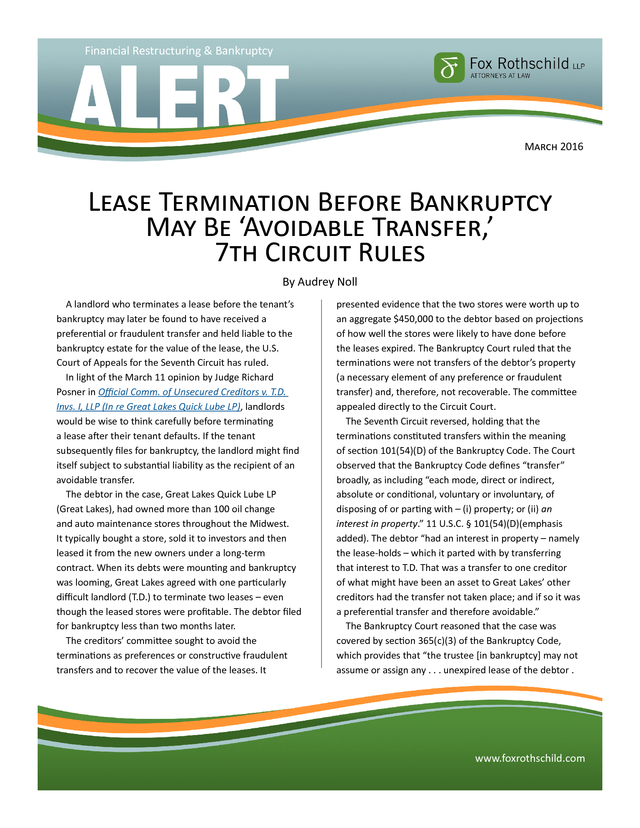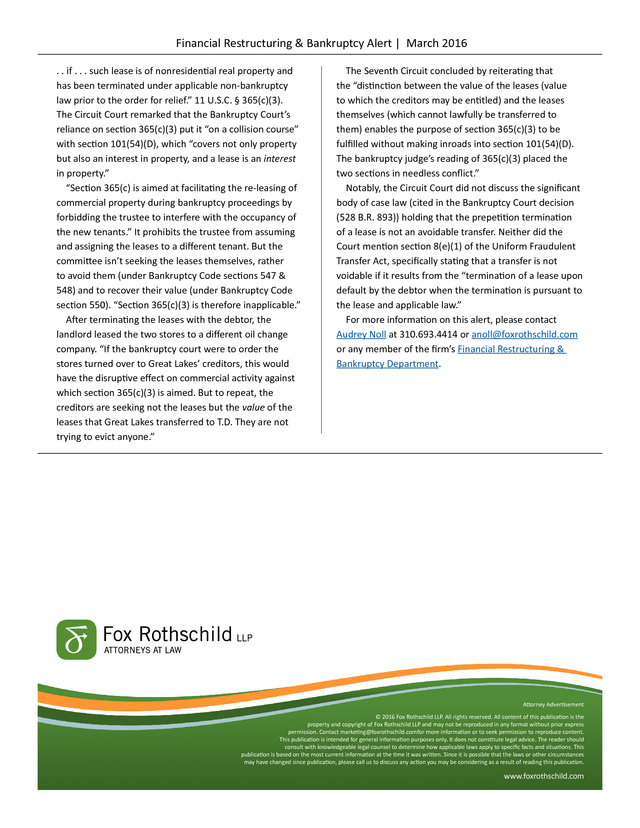Lease Termination Before Bankruptcy May Be ‘Avoidable Transfer,’ 7th Circuit Rules – March 16, 2016
Fox Rothschild
Description
Financial Restructuring & Bankruptcy
March 2016
Lease Termination Before Bankruptcy
May Be ‘Avoidable Transfer,’
7th Circuit Rules
By Audrey Noll
A landlord who terminates a lease before the tenant’s
bankruptcy may later be found to have received a
preferential or fraudulent transfer and held liable to the
bankruptcy estate for the value of the lease, the U.S.
Court of Appeals for the Seventh Circuit has ruled.
In light of the March 11 opinion by Judge Richard
Posner in Official Comm. of Unsecured Creditors v. T.D.
Invs. I, LLP (In re Great Lakes Quick Lube LP), landlords
would be wise to think carefully before terminating
a lease after their tenant defaults.
If the tenant subsequently files for bankruptcy, the landlord might find itself subject to substantial liability as the recipient of an avoidable transfer. The debtor in the case, Great Lakes Quick Lube LP (Great Lakes), had owned more than 100 oil change and auto maintenance stores throughout the Midwest. It typically bought a store, sold it to investors and then leased it from the new owners under a long-term contract. When its debts were mounting and bankruptcy was looming, Great Lakes agreed with one particularly difficult landlord (T.D.) to terminate two leases – even though the leased stores were profitable. The debtor filed for bankruptcy less than two months later. The creditors’ committee sought to avoid the terminations as preferences or constructive fraudulent transfers and to recover the value of the leases.
It presented evidence that the two stores were worth up to an aggregate $450,000 to the debtor based on projections of how well the stores were likely to have done before the leases expired. The Bankruptcy Court ruled that the terminations were not transfers of the debtor’s property (a necessary element of any preference or fraudulent transfer) and, therefore, not recoverable. The committee appealed directly to the Circuit Court. The Seventh Circuit reversed, holding that the terminations constituted transfers within the meaning of section 101(54)(D) of the Bankruptcy Code.
The Court observed that the Bankruptcy Code defines “transfer” broadly, as including “each mode, direct or indirect, absolute or conditional, voluntary or involuntary, of disposing of or parting with – (i) property; or (ii) an interest in property.” 11 U.S.C. § 101(54)(D)(emphasis added). The debtor “had an interest in property – namely the lease-holds – which it parted with by transferring that interest to T.D.
That was a transfer to one creditor of what might have been an asset to Great Lakes’ other creditors had the transfer not taken place; and if so it was a preferential transfer and therefore avoidable.” The Bankruptcy Court reasoned that the case was covered by section 365(c)(3) of the Bankruptcy Code, which provides that “the trustee [in bankruptcy] may not assume or assign any . . .
unexpired lease of the debtor . www.foxrothschild.com . Financial Restructuring & Bankruptcy Alert | March 2016 . . if . .
. such lease is of nonresidential real property and has been terminated under applicable non-bankruptcy law prior to the order for relief.” 11 U.S.C. § 365(c)(3). The Circuit Court remarked that the Bankruptcy Court’s reliance on section 365(c)(3) put it “on a collision course” with section 101(54)(D), which “covers not only property but also an interest in property, and a lease is an interest in property.” “Section 365(c) is aimed at facilitating the re-leasing of commercial property during bankruptcy proceedings by forbidding the trustee to interfere with the occupancy of the new tenants.” It prohibits the trustee from assuming and assigning the leases to a different tenant.
But the committee isn’t seeking the leases themselves, rather to avoid them (under Bankruptcy Code sections 547 & 548) and to recover their value (under Bankruptcy Code section 550). “Section 365(c)(3) is therefore inapplicable.” After terminating the leases with the debtor, the landlord leased the two stores to a different oil change company. “If the bankruptcy court were to order the stores turned over to Great Lakes’ creditors, this would have the disruptive effect on commercial activity against which section 365(c)(3) is aimed.
But to repeat, the creditors are seeking not the leases but the value of the leases that Great Lakes transferred to T.D. They are not trying to evict anyone.” The Seventh Circuit concluded by reiterating that the “distinction between the value of the leases (value to which the creditors may be entitled) and the leases themselves (which cannot lawfully be transferred to them) enables the purpose of section 365(c)(3) to be fulfilled without making inroads into section 101(54)(D). The bankruptcy judge’s reading of 365(c)(3) placed the two sections in needless conflict.” Notably, the Circuit Court did not discuss the significant body of case law (cited in the Bankruptcy Court decision (528 B.R. 893)) holding that the prepetition termination of a lease is not an avoidable transfer.
Neither did the Court mention section 8(e)(1) of the Uniform Fraudulent Transfer Act, specifically stating that a transfer is not voidable if it results from the “termination of a lease upon default by the debtor when the termination is pursuant to the lease and applicable law.” For more information on this alert, please contact Audrey Noll at 310.693.4414 or anoll@foxrothschild.com or any member of the firm’s Financial Restructuring & Bankruptcy Department. Attorney Advertisement © 2016 Fox Rothschild LLP. All rights reserved. All content of this publication is the property and copyright of Fox Rothschild LLP and may not be reproduced in any format without prior express permission.
Contact marketing@foxrothschild.comfor more information or to seek permission to reproduce content. This publication is intended for general information purposes only. It does not constitute legal advice. The reader should consult with knowledgeable legal counsel to determine how applicable laws apply to specific facts and situations.
This publication is based on the most current information at the time it was written. Since it is possible that the laws or other circumstances may have changed since publication, please call us to discuss any action you may be considering as a result of reading this publication. www.foxrothschild.com .
If the tenant subsequently files for bankruptcy, the landlord might find itself subject to substantial liability as the recipient of an avoidable transfer. The debtor in the case, Great Lakes Quick Lube LP (Great Lakes), had owned more than 100 oil change and auto maintenance stores throughout the Midwest. It typically bought a store, sold it to investors and then leased it from the new owners under a long-term contract. When its debts were mounting and bankruptcy was looming, Great Lakes agreed with one particularly difficult landlord (T.D.) to terminate two leases – even though the leased stores were profitable. The debtor filed for bankruptcy less than two months later. The creditors’ committee sought to avoid the terminations as preferences or constructive fraudulent transfers and to recover the value of the leases.
It presented evidence that the two stores were worth up to an aggregate $450,000 to the debtor based on projections of how well the stores were likely to have done before the leases expired. The Bankruptcy Court ruled that the terminations were not transfers of the debtor’s property (a necessary element of any preference or fraudulent transfer) and, therefore, not recoverable. The committee appealed directly to the Circuit Court. The Seventh Circuit reversed, holding that the terminations constituted transfers within the meaning of section 101(54)(D) of the Bankruptcy Code.
The Court observed that the Bankruptcy Code defines “transfer” broadly, as including “each mode, direct or indirect, absolute or conditional, voluntary or involuntary, of disposing of or parting with – (i) property; or (ii) an interest in property.” 11 U.S.C. § 101(54)(D)(emphasis added). The debtor “had an interest in property – namely the lease-holds – which it parted with by transferring that interest to T.D.
That was a transfer to one creditor of what might have been an asset to Great Lakes’ other creditors had the transfer not taken place; and if so it was a preferential transfer and therefore avoidable.” The Bankruptcy Court reasoned that the case was covered by section 365(c)(3) of the Bankruptcy Code, which provides that “the trustee [in bankruptcy] may not assume or assign any . . .
unexpired lease of the debtor . www.foxrothschild.com . Financial Restructuring & Bankruptcy Alert | March 2016 . . if . .
. such lease is of nonresidential real property and has been terminated under applicable non-bankruptcy law prior to the order for relief.” 11 U.S.C. § 365(c)(3). The Circuit Court remarked that the Bankruptcy Court’s reliance on section 365(c)(3) put it “on a collision course” with section 101(54)(D), which “covers not only property but also an interest in property, and a lease is an interest in property.” “Section 365(c) is aimed at facilitating the re-leasing of commercial property during bankruptcy proceedings by forbidding the trustee to interfere with the occupancy of the new tenants.” It prohibits the trustee from assuming and assigning the leases to a different tenant.
But the committee isn’t seeking the leases themselves, rather to avoid them (under Bankruptcy Code sections 547 & 548) and to recover their value (under Bankruptcy Code section 550). “Section 365(c)(3) is therefore inapplicable.” After terminating the leases with the debtor, the landlord leased the two stores to a different oil change company. “If the bankruptcy court were to order the stores turned over to Great Lakes’ creditors, this would have the disruptive effect on commercial activity against which section 365(c)(3) is aimed.
But to repeat, the creditors are seeking not the leases but the value of the leases that Great Lakes transferred to T.D. They are not trying to evict anyone.” The Seventh Circuit concluded by reiterating that the “distinction between the value of the leases (value to which the creditors may be entitled) and the leases themselves (which cannot lawfully be transferred to them) enables the purpose of section 365(c)(3) to be fulfilled without making inroads into section 101(54)(D). The bankruptcy judge’s reading of 365(c)(3) placed the two sections in needless conflict.” Notably, the Circuit Court did not discuss the significant body of case law (cited in the Bankruptcy Court decision (528 B.R. 893)) holding that the prepetition termination of a lease is not an avoidable transfer.
Neither did the Court mention section 8(e)(1) of the Uniform Fraudulent Transfer Act, specifically stating that a transfer is not voidable if it results from the “termination of a lease upon default by the debtor when the termination is pursuant to the lease and applicable law.” For more information on this alert, please contact Audrey Noll at 310.693.4414 or anoll@foxrothschild.com or any member of the firm’s Financial Restructuring & Bankruptcy Department. Attorney Advertisement © 2016 Fox Rothschild LLP. All rights reserved. All content of this publication is the property and copyright of Fox Rothschild LLP and may not be reproduced in any format without prior express permission.
Contact marketing@foxrothschild.comfor more information or to seek permission to reproduce content. This publication is intended for general information purposes only. It does not constitute legal advice. The reader should consult with knowledgeable legal counsel to determine how applicable laws apply to specific facts and situations.
This publication is based on the most current information at the time it was written. Since it is possible that the laws or other circumstances may have changed since publication, please call us to discuss any action you may be considering as a result of reading this publication. www.foxrothschild.com .













